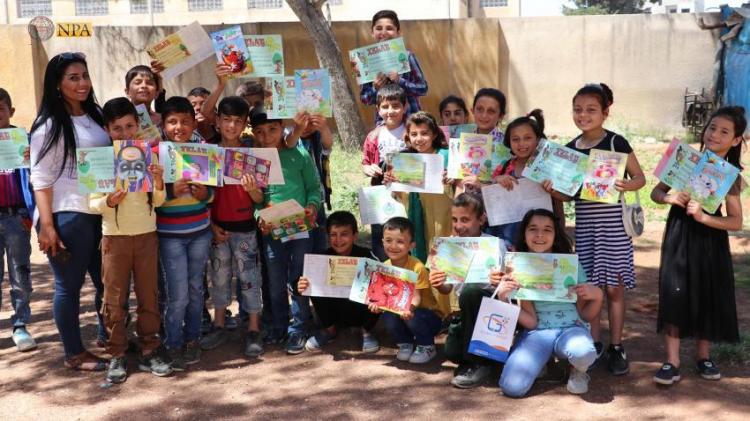Preparations to receive more than 200,000 students in al-Jazira region’s schools
Qamishli – North-Press Agency
Ibrahim al-Ibrahimi
The Education Authority in al-Jazira region (an administrative division comprising the cities of Hasakah and Qamishli and its districts) declared that the new school year of the education system of the Autonomous Administration in north and eastern Syria will begin on September 2, students will begin the new school year on the 15th of the same month; as the Education Authority is preparing to open schools, distribute books and teachers.
Samira Haj Ali, the co-chair of the Education Authority told North-Press about the work and preparations for this year that during the summer vacation they have trained the teachers for the academic year of 2019/2020 on the curriculum which is printed in three languages, Kurdish, Arabic and Syriac.
“The preparations include cleaning up the schools, distributing teachers, registering the new pupils, and appointing school principals, in the first half of September,” she said.
Many schools in the war-torn areas of al-Jazira region were destroyed and unsuitable for education, but the Education Authority has renovated schools in cities which were attacked by the Islamic State group (ISIS), such as al-Hawl, al-Shadadi, Merkada and Dashisha, according to the co-chair of the Education Authority.
Regarding the authority’s readiness to distribute books for students, Haj Ali said: “The curriculum foundation has printed the curriculum for this academic year; in addition the last year’s books will also be distributed”.
Samira Haj Ali blames the international organizations which operate in al-Jazira region and concerned with the field of education that “they aren’t helping the Autonomous Administration in this field at all”.
Specialties
During the summer, the instructors of the Kurdish and Arab languages attended at the academies of specialties in Hasakah and Qamishli, and took courses in the curriculum subjects for the preparatory and secondary stages.
It’s worth mentioning that the Martyr Agid Academy of Kurdish specialties was opened in Qamishli in April 2019, the academy has scientific and literary disciplines.
Sheilan Mohammed, an administrator at the academy told North-Press: “The Academy aims to develop the teachers in the disciplines”.
Mohammed said that those who join the academy are required to have obtained the Education Institute’s certificate and have completed Kurdish language levels.
She added: “Four groups received the specialization course, numbered of 260 teachers, while 87 teachers are undergoing the current course”.
Statistics
According to the records of the Education Authority in al-Jazira region, about 2225 schools will open in this new year, including 1652 primary schools, 405 preparatory schools, 86 secondary schools, and 82 co-educational schools for boys and girls.
According to the authority’s records, about 230,489 students will attend schools this year, 19,189 teachers will teach in al-Jazira region’s schools, 9,400 teachers will teach in Qamishlo canton (an administrative division comprising cities and towns in Qamishli from Amuda to Derik), and 9221 teachers will teach in Hasakah canton (An administrative division comprising cities and towns between Derbasiyah, Sere-Kaniye/Ras al-Ein, al-Shadadi and al-Hawl).
The Democratic Autonomous Administration began applying its curricula since 2015-2016, where it first applied for grades 1 to 3, and then successively applied its curricula for other classes that reached the eleventh grade in 2018-2019, and it is preparing to introduce the curricula for the thirteenth grade in 2020-2021.
These curricula are not limited to teach in the Kurdish language, but have also been developed in the Syriac and Arabic languages.
The curriculum adopts a different approach from the Syrian government education system in Syria in assessing pupils.
In the educational system in Syria, students have been evaluated for decades on the basis of mid-term and final exams, then they are granted a certificate that authorizes them to move from one grade to another or fail and stay in the same grade. While the Education Authority of the Autonomous Administration implements a new method of passing the grades based on assessment rather than examinations.

